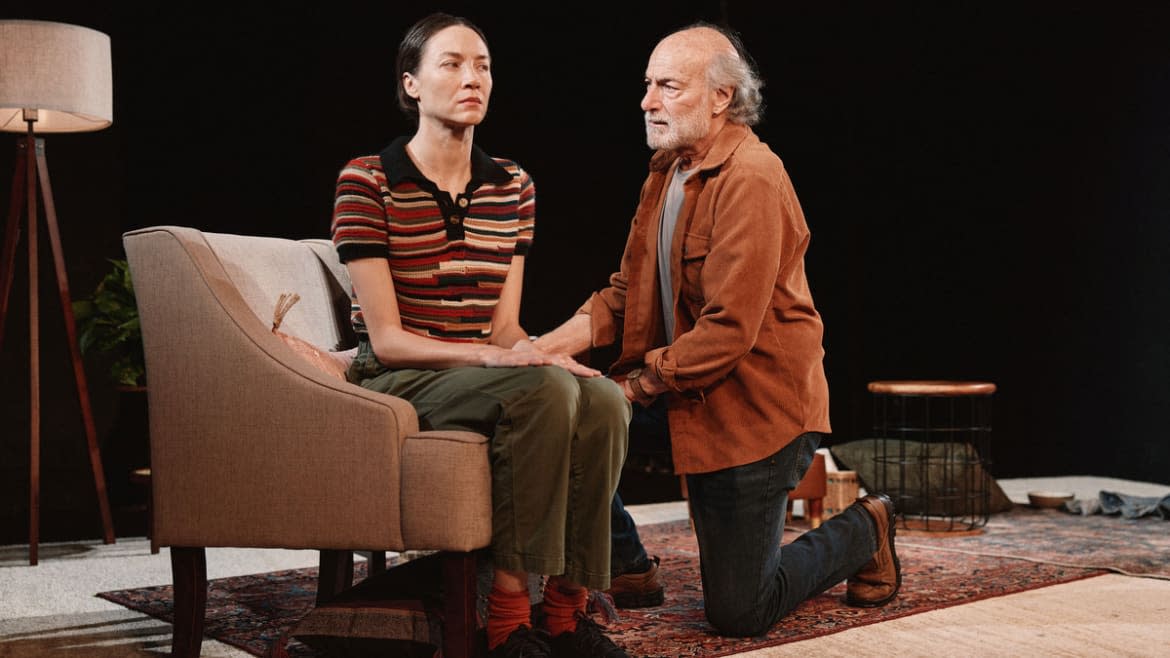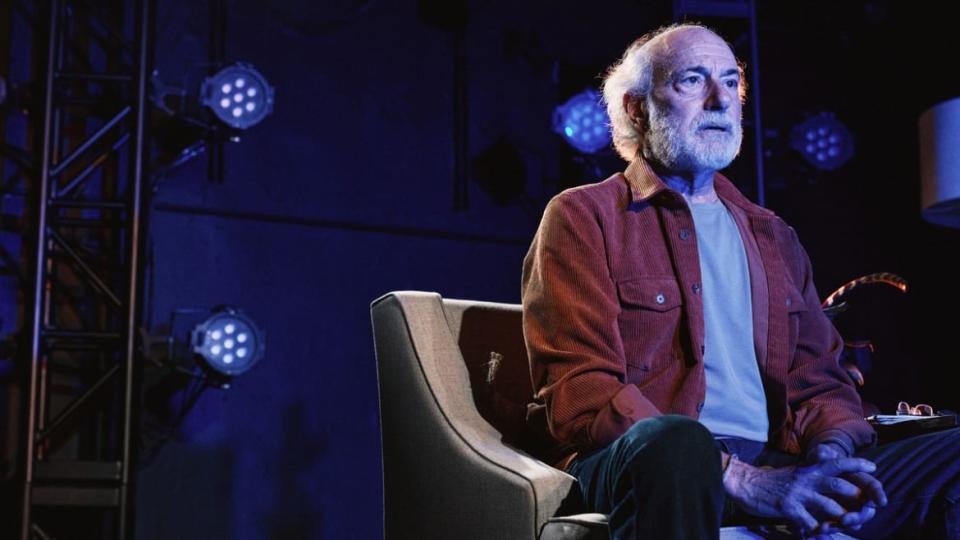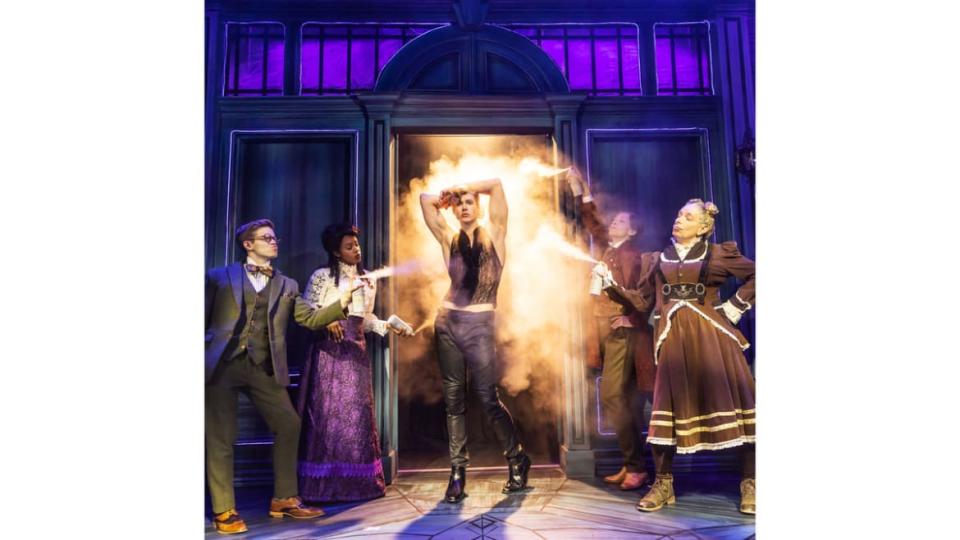‘Job’ Review: When a Therapy Session Becomes a Hostage Situation

- Oops!Something went wrong.Please try again later.
It looks like a therapy session but, as terrified therapist Loyd (Peter Friedman) eventually tells client Jane (Sydney Lemmon), it is actually a hostage situation. When Job (SoHo Playhouse, to Oct. 8) opens, she is facing him holding a gun, and he understandably seems utterly freaked out.
Jane is a tech worker—her job to sift the crudest, most offensive material and make it disappear—who has had some kind of breakdown, which culminated in a meltdown at work. That meltdown, which saw her standing on a table and shouting, went viral online. From being the judge and jury of online content herself she herself has become a notorious online personality. She really doesn’t want to be in this room; having therapy is merely a box-ticking exercise in her intention to get her job back.
The Strange, Nervous Rise of the Therapist Chatbot
“I’ll talk about anything that you feel will give you grounds to reinstate me,” she tells Loyd.
To say much more about the plot of the play would be to spoil its major twist, but its author Max Wolf Friedlich threads the strange dance between the two lead characters with a steady build-up of revelation and tension. Even with the gun secreted in Jane’s bag, we know it is there—and the presence of an unused gun in a play can only mean we have not seen the last of it. Friedman’s therapist tries to be avuncular and calm, even though he is trapped. When Jane goes to take a box of Altoids out of his bag, he recoils, certain the gun is about to be brought out again.
Jane herself is sardonic, dry, keen to parry; her upset clouded by layers of ironic detachment.
Do you often use humor to help process more serious things?” Loyd asks her.
“No, I’m more of Xanax girlie,” she replies.
In an uneven but intense play, directed by Michael Herwitz, both performances are riveting in very different registers; Lemmon’s Jane is both sharp and fractured, a coiled spring of acid all-knowingness, whose fury means we, like Loyd, fear what she is capable of.

Peter Friedman as Loyd in 'Job.'
We hear fragments of her personal story, alongside her holding forth on the dysfunction of the internet, and the generational clash she sees between the young of today and Loyd’s Boomers. These are the weakest parts of the play, feeling like lazy retreads of countless magazine articles on the same topic. Her aggression is constant, and while Loyd tries to speak, and get her to open up, her antagonism alights on a new target.
Friedman’s Loyd is, like Jane says witheringly, a San Francisco throwback to its much-venerated hippie heyday, which Jane trashes to his face. At least at the beginning, while Loyd nervously contemplates the presence of the firearm, he is also swept up in her streams of invective and frustration.
A typical day for her, as she awaits to see how her professional fate shakes out thus: she marches into the bathroom, “and I brush my teeth and fuck around with my hair and eat my muesli and I drink my coffee and as I do each of those things the panic turns them into little missions… These little morning routine fucking inconsequential things become a sense of real... purpose... but on days like today there just isn’t anything else—there’s only me and the panic, alone together.” That, she says, is why she carries the gun.
Throughout the play, its lighting and sound design present little ruptures; we zip around in time, and inside troubled minds. What does Jane want? Just her job back? What job is Loyd doing here, and how can he do it if he is fearing for his life faced with an unstable client? Away from the calm authority of the therapist’s couch, Loyd has another, very different job.
Jane insists she had “a perfectly nice granola middle class existence—nothing to cry about,” with a father who is “a failed artist who mopes around silently demanding praise for courageously not watching the Super Bowl.” Jane then asks about Loyd’s family. And this is where the play changes course, and sirens ping about spoilers.
Jane’s job as a content moderator means she has seen the worst of the world, she says. “The phone is never the problem—people do bad things, not phones,” she insists. She has seen “car crash compilations, mass graves, heroin overdoses, a website for strep throat fetishists. People eating glass, people sticking glass up their assholes and vaginas.”
“To be effective in my role I had to come into work fucking infuriated, I had to actually reckon with what had happened to these people,” she says.
But then, at least at her workplace there was “panko-crusted tilapia every day,” and private yoga.
And then her meltdown made her “a meme. I was ‘when you ask to speak to the manager’ but the person behind the counter is the manager. I was mental health”—and much more besides.
What is true and what is diversionary rhetoric becomes ever cloudier. Jane’s intelligence and self-insight flay any sense of politesse on impact.
“The legacy of the 60s is an obsession with aesthetics. To be anti-war you had to wear a tie-dye shirt and grow your hair out and so now, today, I’m not allowed to have ‘good politics’ and wear Lululemon,” Jane says, adding at college she had to “figure out how to dress like I cared about social justice and the cafeteria workers union and gender neutral bathrooms. To give a shit I had to smell like shit—I had to wear ratty t-shirts to be publicly accepted as a good person.”
Loyd eventually has enough of Jane’s barrage of eloquent, self-indulgent snark: “I think on your best days you’re an extremely competent person, but where you falter is your unwillingness to accept the idea that someone might actually understand you. You don’t know yourself, and so you can’t accept the idea that anyone else might.”
This is no therapy session, he says. The gun’s presence has rendered that null and void. “Please realize what is happening here. You are holding me hostage.”
The play here takes its violent left turn, which is only obvious in the seconds before it is made starkly plain. However, Job doesn’t quite connect this revelation and its fallout with what we have sat through preceding it. As the characters transform in front of us, we need to hear more from Loyd—but, in its closing moments, Job throws on its head the professional and personal dynamics between Loyd and Jane. This ending feels rushed and flimsy; a kind of slalom towards a “tale of the unexpected,” showing off its sting in the tail rather than taking a necessary slice of time to explain itself. Instead, Jane continues to hold forth, Loyd stays mostly silent. And the gun—well, yes, wouldn’t y’know, we hadn’t seen the last of it.
Swing State
A schematic play isn’t necessarily a bad one, and in Rebecca Gilman’s story (Audible Theater at Minetta Lane Theatre, to Oct. 28) of what links a grieving widow—Peg, played with an affecting, careworn intensity by Mary Beth Fisher—and troubled young Ryan (Bubba Weiler), there is much to enjoy, principally in Peg’s feelings of loss, alongside her determination to help him, and and save the beloved prairie she owns.

Mary Beth Fisher, left, and Bubba Weiler in 'Swing State.'
But Sheriff Kris (Kirsten Fitzgerald), aided by niece and rookie recruit Dani (Anne E. Thompson) are investigating a theft, and believe Ryan to be responsible. Again, there’s a gun mentioned, so again, we know at the fateful moment, what should appear but… you guessed it. What makes Swing State so involving is the twinned care of writing and performances. Fisher’s standout study in grief is the haunting anchor of the play.
Dracula, a Comedy of Terrors
Do you just want a laugh? Gordon Greenberg and Steve Rosen’s proudly silly take on Dracula (New World Stages, to Jan. 7) has jokes and wordplay (from inspired to groan-out-loud) by the truckload, characters cross-dressing and actors doubling up as other characters.

l to r, Andrew Keenan-Bolger, Jordan Boatman, James Daly, Ellen Harvey, and Arnie Burton in 'Dracula, a Comedy of Terrors.'
James Daly’s ripped, vain, slightly annoyed Dracula swirls around the stage aided by Andrew Keenan-Bolger, Ellen Harvey, Arnie Burton, and Jordan Boatman. It’s funny, if overlong and overplayed; a long skit meets merry pantomime—with the unerring ability, just when it begins to pall, to lift another daffy comic rabbit out of its hat.
Get the Daily Beast's biggest scoops and scandals delivered right to your inbox. Sign up now.
Stay informed and gain unlimited access to the Daily Beast's unmatched reporting. Subscribe now.

